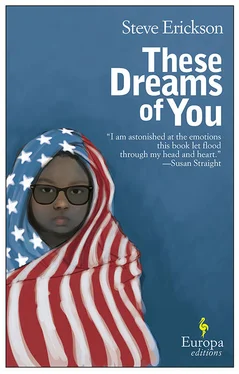“A license?” laughed Roberto. “For what?”
“To broadcast?”
“ It’s the canyon . License? We don’t need no stinking license.” A few CDs lay scattered on the floor. “But what about the music?”
“Don’t you worry about the music, either,” said Zan.
On the way to an art workshop for kids that she teaches for extra income, Viv drops off Parker and Sheba at the Añejo as Zan’s shift ends, and in the car driving home Zan pulls off the road at the old railroad bridge down the road. The canyon abounds with competing legends all ending with the same conclusion, that the bridge is haunted, the only matter of contention being by whom, the ghosts of displaced Indians or the victims of devil rites or crazed hippie killers. This is the bucolic canyon from which, forty years ago, Charles Manson fled because it was too weird for him.
Parker has been jonesing to see the railroad bridge since he noticed it one day from the car on the way to the ocean. But because it’s dusk, when the canyon light fails so fast and the heat so quickly turns cold, the boy doesn’t want to linger, as he and his sister and father stand in the middle surveying the decayed wood and listening to the sound of the creek beneath them. Up one corner of the bridgehouse runs a ladder to the rafters. From the apex of the frame, Zan and the kids have a view of the canyon and whatever should roll in from the ocean.
Parker says, “Let’s leave.” He’s a fearless kid who will brave things Zan never did as a boy — some death-defying stunt on a skateboard, some preposterously lethal warp-speed roller coaster — but dark closed places push his courage to its breaking point. “Zan,” he says.
“I want to stay,” says Sheba.
“You only want to stay because I want to go,” Parker says.
“I want to stay!” she says again, though it’s not at all clear what it is she wants to stay for other than to momentarily seize control of a life that always feels outside her control. “I WANT TO STAY, I WANT TO STAY, I WANT TO STAY,” and the railroad car becomes a megaphone, the four-year-old’s voice careening from bend to dell and hilltop.
As the babble of the creek rises from the dark through the boxcar windows, a twelve-year-old imagination bubbles. Peering from the bridgehouse’s rafter toward the ocean, Parker says, “When it comes, will the tsunami reach this far?”
The four were driving down Pacific Coast Highway, mostly in silence but for the harmonics coming from Sheba’s body, when they passed new signs demarcating “tsunami safety zones.”
“Stop singing,” Parker was crying in exasperation to his sister.
“I’m not,” said Sheba.
“She can’t help it,” said Zan, “it’s not coming from her.”
“It is coming from her,” said Parker.
“I’ve never noticed those,” Viv said about the signs.
“It’s coming from her but not actually. Through her.”
“How big,” said Parker, “is a tsunami compared to a regular wave anyway?”
“No,” Zan agreed about the signs, “they’re new,” then to Parker, “Big.”
The signs apparently meant to indicate what level of ground people must flee to in order to be safe. “Would one hit our house?” said Parker.
“No,” said his father.
“We don’t have to worry about tsunamis,” said Viv, and though she didn’t mean it that way, the implication was there already were enough things to worry about. Zan wondered if Viv was thinking the same thing, which was, If the bank takes the house, bring on that damned tsunami — but more likely Viv was just trying to strike from her children’s running list of horribles one more horror. “The ocean might come up into the canyon a bit,” said Zan, and Viv shot him a look: Oh, great. Tell them the tsunami’s going to come into the canyon. “Just a bit,” Zan hastily stressed. “Where the canyon begins.”
“Über cool,” said Parker. He’s at the age where it’s hard for Zan to tell the cool from the holocaustic; lately Parker and his friends call something “sick” when they mean it’s great. What does that say about the era? wonders Zan. How and when did something outstanding become “tight” and what connotations could it have to his twelve-year-old? When I was young, Zan remembers, things were “wicked.” Wicked was good and soon we were doing things that we thought were good that for centuries people thought were wicked. In our slang lies the future.
Not long ago, Parker asked to trade his larger room in the house for a smaller one with no bathroom attached — which is to say a room that no one else in the family ever has reason to enter. The boy now is at an age when he happily barters twice the space for a door he can shut to the rest of the world. Lying in bed in the dark, Viv uttered to Zan four words that portended doom as surely as We are at war or All hope is lost : “He’s becoming a teenager,” and the father shuddered.
Parker with his otherworldly beauty that always bewildered his parents, soon to kamikaze into acne and wet dreams as well as a newfound status — that Zan never could have imagined when he was Parker’s age — as the class heartthrob. Possessed of a new vanity so surreal and implacable that the boy views the speed bumps on the canyon boulevard as put there solely for the purpose of disrupting his immaculately positioned hair. Parker the stoic with his monk’s smile, allowing of course for the melodrama of a budding artist who already makes his own movies on Zan’s laptop as well as writing and drawing Shrimpy Comix , about a mutant, or maybe just odd, crustacean. Of course all this is interspersed with adolescent tantrums, but also the occasional moment when Viv catches their son reading to his sister Shrimpy #3, hot off the press, as the girl curls in the crook of the boy’s arm listening.
In the car on Pacific Coast Highway, Parker said, “If they have a huge earthquake in Tokyo, would the wave roll all the way across the ocean here?” He’s never been to Tokyo but is fascinated by the idea of it, an animé city.
Together Zan and Viv reached the same conclusion, which was there was no getting around a conversation about tsunamis. “No,” said Zan. “If they had one in Hawaii, maybe.” Viv shot him another look.
“I don’t understand how it works,” said Parker.
“The ground under the sea moves and the water is. . displaced.” He looked at Viv: right?
Viv shrugged. “First the water goes all the way out.”
“If you ever go to the beach,” said Zan, “and there’s a lot more beach than you’ve ever seen, don’t go play on it.”
“Get far away,” Sheba interjected for the first time from her booster seat in the back. Viv had the usual look on her face that said, Is this useful information or child abuse? Parenthood is another word for fear management. In the backseat Sheba stared out the window, already seeing the wave in the distance.
When they got back to the house, Zan stopped at the top of their insanely steep driveway and dropped Viv off at the mailbox. He drove down the drive and got out of the car, anxiously gazing back up at Viv; he loved the days they got only junk mail, except for the once a year when there was a royalty check from some foreign country full of perplexing people who read Zan’s books from years before. Everyone had been in the house for five minutes when Viv said, just as Zan was thinking it, “Where’s Sheba?”
Zan rushed back out onto the deck of the house and peered over the rail at the car parked below, from where Sheba was extracting herself. The little girl glared back up at her father. “YOU LEFT ME IN THE CAR!”
Читать дальше











